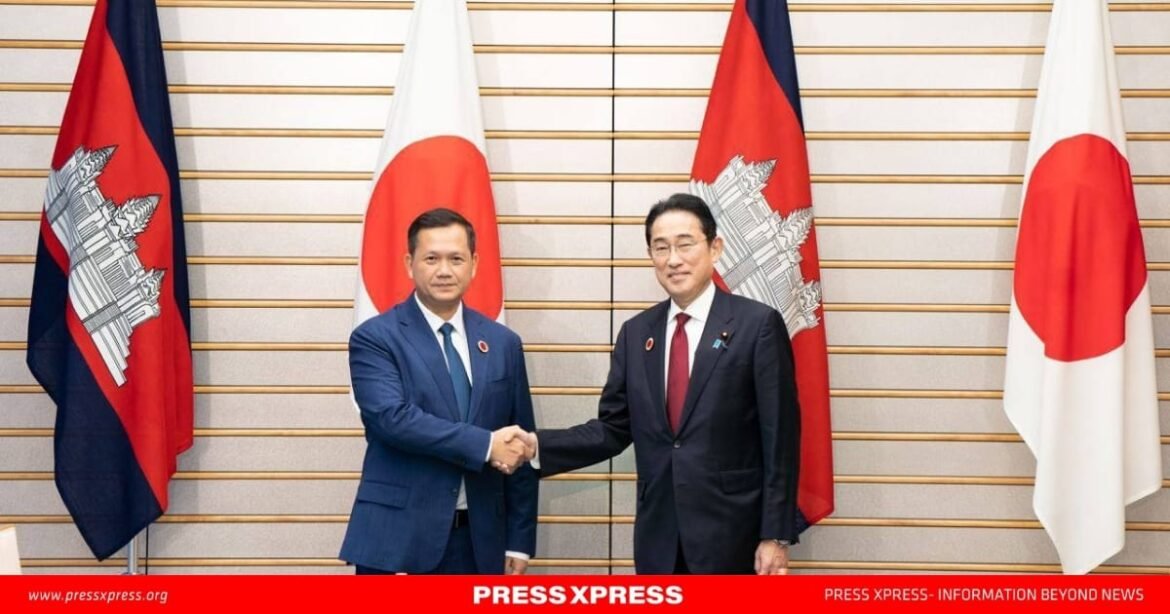The recent meeting between Hun Sen, President of the Cambodian Senate, and Nishimura Yasutoshi, a Member of Japan’s House of Representatives and former Minister of Economy, Trade and Industry, reaffirmed the enduring commitment of both nations to further strengthen their bilateral relations. Over the years, Cambodia and Japan have built a robust partnership, but their collaboration is now evolving to address new global challenges, particularly trade tensions and regional security concerns.
A Strong Foundation of Cooperation
Cambodia and Japan’s relationship has long been defined by cooperation in key sectors, with Japan playing a significant role in Cambodia’s development. These areas of cooperation include infrastructure, economic investment, and security, all of which continue to thrive.
Nishimura Yasutoshi emphasized Japan’s contributions to Cambodia’s development, notably in mine clearance, where Japan’s support remains vital in dealing with the remnants of unexploded ordnance from past conflicts. The partnership has also led to increased Japanese investment in Cambodia, with
Japanese companies expanding their presence in the country. Moreover, Cambodia’s support for Japan’s Indo-Pacific Strategy highlights the growing alignment of their political and security interests.
Japan’s Vital Role in Cambodia’s Development
Hun Sen expressed deep gratitude for Japan’s substantial contributions to Cambodia’s development agenda. One of the most impactful areas is infrastructure development. Japan has been instrumental in building critical infrastructure, including roads, bridges, and port facilities. A prime example is the Sihanoukville Autonomous Port, a major trade hub under development with Japanese assistance. This port is central to Cambodia’s broader strategy to enhance its logistics and trade capabilities, aiming to boost both regional and global trade.
Additionally, the growing security collaboration between the two countries was underscored by the recent port visit of Japan’s Maritime Self-Defence Force to Cambodia’s Ream Naval Base. This military engagement signifies not only deepening defense ties but also a shared commitment to regional stability and security.
Navigating the Evolving Global Trade Landscape
Hun Sen’s remarks on the shifting global trade environment highlighted the increasing complexities Cambodia faces as trade tensions escalate between major global economies. These disruptions have created challenges for many countries, including Cambodia, as businesses navigate the uncertainties in global supply chains.
However, Cambodia stands to benefit from these changes. With its strategic location in Southeast Asia and its growing infrastructure, the country is becoming an increasingly attractive destination for foreign direct investment (FDI). Japanese businesses, in particular, are keen to diversify their supply chains and expand their investments in Cambodia as part of their regional strategies.
Key Areas of Bilateral Cooperation
The partnership between Cambodia and Japan spans several critical sectors:
Economic Cooperation and Investment:
Japan continues to play a crucial role in Cambodia’s economic development by providing investment in infrastructure projects and fostering a conducive environment for business growth.
The ongoing development of the Sihanoukville Autonomous Port exemplifies Japan’s support for Cambodia’s trade ambitions.
Infrastructure Development:
Japan has been instrumental in developing Cambodia’s transportation networks, including roads and bridges, contributing to the country’s economic growth and regional connectivity.
Security and Defense:
Recent security cooperation, including the port call by Japan’s Maritime Self-Defence Force at Ream Naval Base, demonstrates the shared commitment to ensuring regional peace and stability.
Humanitarian Support:
Japan’s continued involvement in Cambodia’s mine clearance initiatives has played a significant role in removing the remnants of past conflicts and ensuring the safety of Cambodian citizens.
Adapting to Global Trade Shifts
Hun Sen’s comments about the changing global trade landscape reflect the evolving challenges Cambodia faces as it adapts to new economic realities. Trade tensions between major global powers have disrupted traditional supply chains, making it essential for countries like Cambodia to remain flexible and attract new investment. Cambodia’s open trade policies and commitment to infrastructure development position it as an ideal alternative for businesses seeking to diversify their production bases away from other regions affected by trade disruptions.
Japan’s Investment in Cambodia: A Growing Economic Force
Japan’s growing investment in Cambodia plays a central role in the country’s economic trajectory. As Cambodia strengthens its trade infrastructure, Japanese investments in manufacturing, logistics, and other sectors will be critical to the country’s economic progress. The Cambodian government is keen to leverage this partnership to accelerate its integration into the regional and global economy, making it an increasingly important player in Southeast Asia.
Both countries are focused on harnessing their economic cooperation to overcome external challenges and foster mutual growth in the face of global uncertainty.
Strategic Outlook
The future of Cambodia-Japan relations is promising, with both nations looking to deepen their collaboration in key areas like infrastructure, trade, and security. As Cambodia continues to enhance its infrastructure and improve its investment climate, Japan’s support will be vital in ensuring the country’s sustained growth.
This partnership, built on a foundation of trust and mutual benefit, provides a model for other Southeast Asian nations navigating similar geopolitical and economic challenges. By continuing to foster strong, multifaceted relationships, Cambodia and Japan are well-positioned to face the uncertainties of the global trade environment and ensure stability and prosperity in the years ahead.
The recent meeting between Hun Sen and Nishimura Yasutoshi highlights the enduring strength of Cambodia-Japan relations and underscores the growing importance of their partnership in the context of evolving global trade dynamics. Both countries are committed to deepening their collaboration in infrastructure, trade, security, and humanitarian efforts. This partnership is not only crucial for Cambodia’s growth but also for Japan’s regional strategy, positioning both nations as key players in the Indo-Pacific region.


